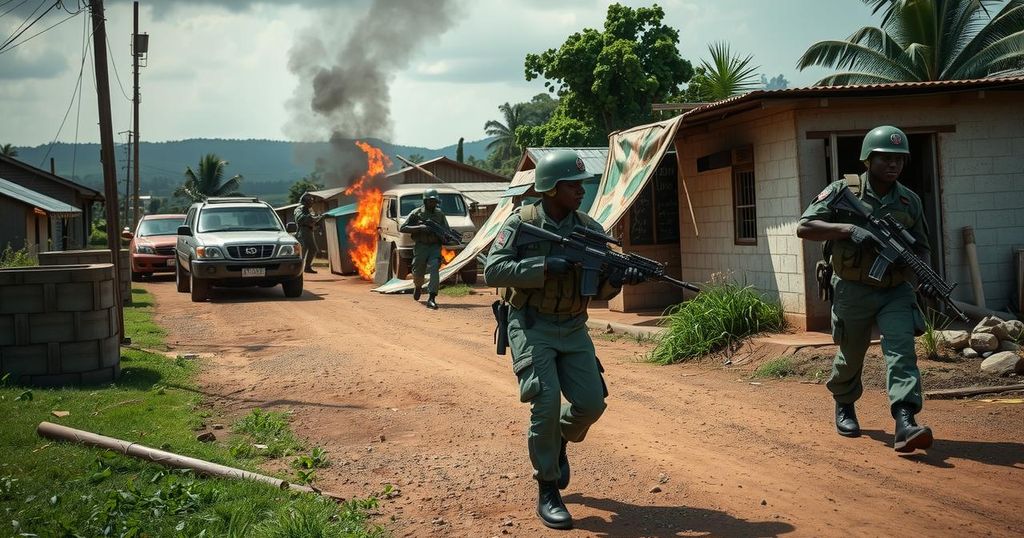Rwanda-backed M23 rebels have captured Masisi, a key town in the eastern Democratic Republic of Congo. This marks the group’s second recent takeover in North Kivu, exacerbating the ongoing humanitarian crisis. Despite attempts at mediation between DRC and Rwanda, military and diplomatic efforts face significant challenges, with concerns over resource exploitation and civilian safety continuing to insidiously rise.
Rebel factions allied with Rwanda have successfully seized control of Masisi, a strategic town located in the eastern region of the Democratic Republic of Congo (DRC). This capture marks the second town overtaken by the M23 group within a span of just two days, further extending their influence in the mineral-rich North Kivu province. The M23 has been progressively gaining ground in eastern DRC since the onset of hostilities in 2021, resulting in the displacement of several hundred thousand individuals from their homes.
Efforts by Angola to facilitate dialogue between the DRC’s President Félix Tshisekedi and Rwandan President Paul Kagame have unfortunately stalled. Alexis Bahunga, a member of the North Kivu provincial assembly, expressed his deep concern regarding the implications of Masisi’s capture, stating that it “plunges the territory into a serious humanitarian crisis.” He has called upon the government to enhance the military capabilities in the region to counter the escalating violence. Eyewitness accounts detail that the M23 has engaged with the local populace, proclaiming their intention to “liberate the country.”
Masisi, with a population nearing 40,000, serves as the administrative center of its namesake territory and lies approximately 80km north of Goma, the provincial capital of North Kivu. The M23 had previously held Goma before withdrawing during the 2012 conflict. Following a lull in hostilities, renewed fighting resumed last December. There are ongoing concerns regarding the potential for the M23 to advance towards Goma again.
In a recent development, Rwanda acknowledged a UN report that estimated around 4,000 of its troops were aiding the M23 forces in the DRC. Rwanda’s government has criticized the Congolese authorities for their inadequate response to the protracted conflicts plaguing eastern DRC. The M23 was established in 2012 as a splinter group to defend the Tutsi population, who historically faced persecution—yet, Rwanda faces allegations of exploiting the turmoil to strip eastern DRC of its valuable resources such as gold and cobalt, crucial for global technology.
In a significant legal move last month, the DRC government initiated a lawsuit against Apple concerning the use of these so-called “blood minerals,” asserting that the tech company had previously sourced materials from the country without consideration for ethical sourcing standards.
The ongoing conflict in eastern DRC involves multiple factions, with the M23 being one of the prominent groups backed by Rwanda. This conflict can be traced back to the aftermath of the Rwandan genocide in 1994, leading to security concerns in both Rwanda and DRC. The M23’s stated intentions have included protecting the Tutsi community from persecution; however, there are serious accusations regarding their role in pilfering valuable mineral resources from the conflict region. International bodies, including the United Nations, have highlighted the humanitarian ramifications of this violence, as local populations face dislocation and crises due to the clashes. As regional powers intervene, diplomatic attempts to stabilize the situation remain tenuous, reflecting a complex interplay of local grievances and geopolitical interests.
The recent seizure of Masisi by Rwanda-backed M23 rebels highlights a significant escalation in the territorial conflict within eastern DRC. With ongoing military maneuvers and unresolved diplomatic negotiations, the situation remains precarious, further exacerbating the humanitarian crisis in the region. As local authorities struggle to respond adequately, the international community must intensify its efforts to address the underlying causes of conflict and protect vulnerable populations affected by this persistent instability. Furthermore, ensuring ethical supply chains for precious minerals sourced from conflict zones remains a critical goal for global governance.
Original Source: www.bbc.co.uk






